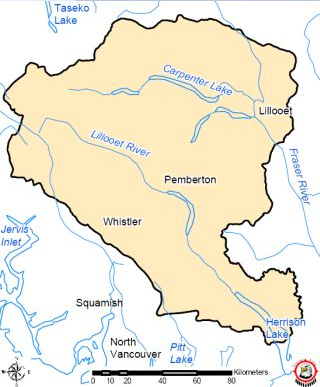STORY posted on April 17, 2011 by dawn
BC Hydro-St'át'imc Authority Agreement Creates a Wave of Opposition
Deal isn't just about past impacts, say critics
Also posted by dawn:
Also in :
A new agreement between BC Hydro, the province of BC, and the St'át'imc Chiefs Council was approved in a nation-wide vote last weekend, but a group of community members say they're still determined to stop the deal.
The six-volume agreement is said to have a net-worth of $210 million. It is payable over the next 99 years through a nation-wide trust and individual one-time pay outs for each of the 11 St’át’imc communities.
Confidential talks between St'át'imc negotiators and BC Hydro took place over 17 years, and the contents of the agreement were released to St'át'imc people in January. It went to a vote on April 9. An estimated 45 per cent of St’át’imc people participated, 72 per cent of whom voted in favour of the deal.
"The majority of our people didn't even know about it," said Roger Adolph, who was chief of the Xaxli'p band for 21 years. “It was initialed off by the Chiefs in December of 2010, then they started having information sessions in January, February, and March,” he said.
Mike Leach, the chair of the St’át’imc Chiefs Council, was one of the key negotiators of the agreement.
“It is definitely a good deal, because we're only dealing with one issue - we're dealing with only the impacts of hydro on the territory,” Leach told the Vancouver Media Co-op.“There is no extinguishment of St’át’imc rights to our lands.”
But the agreement does provide B.C. Hydro with certainty of access and possession to transmission lines and all their facilities on St’át’imc territory, which lies north west of the Fraser Valley. St'át'imc territory, which has never been surrendered or ceded, is already home to three dams, two reservoirs and four generating stations, as well as 15 transmission circuits that make up 850 kilometres of transmission lines. In addition, there are 160 kilometres of access roads and four Hydro built recreation facilities.
“The agreement will provide BC Hydro and the Province of B.C. with operational certainty for BC Hydro’s existing facilities into the future,” reads a press release put out by BC Hydro last week.
“As I read it, aboriginal title has not been extinguished, but it has been limited,” said Adolph, who is a vocal critic of the agreement, and says the recent agreement will change the parameters of struggle against future Hydro projects in St’át’imc territory.
"The Chiefs have agreed that if any individual, group or community that advances a title and right issue [against BC Hydro] through direct action, the Chiefs will come down on those people to stop them,” said Adolph.“It's right in the agreement, in the certainty agreement. I call it a gag order.”
A gag order has already been put into effect at the local level: on April 6th, the publisher of the St’át’imc Runner was locked out of the office where she’s worked for the last five years. The reason given was that the monthly community newspaper ran a four page ad paid for by community members pushing for a “no” vote on April 9th. This came just after BC Hydro provided St’át’imc Nation Hydro with a $500,000 “interim payment," upon the Chiefs’ initialing the agreement on December 17th. These funds were used to promote and carry out its ratification.
Spokespeople for BC Hydro and the provincial Ministry of Aboriginal Relations and Reconciliation refused to comment on the agreement when contacted by the Vancouver Media Co-op.
This is the first time that the St’át’imc people have as a nation made any kind of agreement with the province, which brings with it additional considerations: they now must officially form a nation-level government.
“In order to manage this agreement we will have to put into place a St’át’imc government,” said Leach, who at the moment is interim chair of the St’át’imc Chiefs Council. “Once we've agreed on a format for that government, which we're working on now just to be able to manage this agreement, cause there's a lot involved, there will be an election for a chair once that is done.”
“So if I decided to run, I become the chair, right?” he said, pausing for a moment before adding, “or maybe somebody else.”
But for some, signing an agreement before a structure with a mandate to represent the nation exists is putting the chicken before the egg.
“It's 11 chiefs getting together called the St’át’imc Chiefs Council, now they're calling themselves the St’át’imc Authority, and they don't have a mandate from the people to be there,” said Adolph. “The only mandate they have is for their individual communities where they've been elected by their people under the Indian Act to run Department of Indian Affairs programs.”
As per the new agreement, a new St'át'imc Authority will formally be constituted with recognition by British Columbia, rather than through a St’át’imc process.
“There is no organization, there's no governance structure, there's no bylaws,” said Adolph in reference to the St’át’imc Authority. “They don’t even have an office, and yet the province and BC Hydro recognize the St’át’imc Authority as having the legal power.”
Adolph and others have promised that they will continue to fight the agreement. “There's a group of us and the group is growing,” said Adolph. “This agreement is more than just past grievances,” he said. “BC Hydro got their wish.”
The site for the Vancouver local of The Media Co-op has been archived and will no longer be updated. Please visit the main Media Co-op website to learn more about the organization.



Comments
Statimc Hydro Agreement
Everyone has their opinion, but it should be and educated, informed opiion. In the past, Roger Adolph sat on that SCC negotiating table and should know what was being negotiated.
The agreements could not go forward until Hydro Agreed to connect the 3 Statimc Communities in the Lillooet River Valley, Samahquam, Skatin and Douglas.
Wonder why they don't stand up to stop the Treaty Talks in that Valley, where Statimc Title is being extinguished by the In-Shuck-ch Treaty Group, which now owe 16 million in Traty Loan Agreements. Loans that the Membership had no say in, or ever been provided Audtis of.
The Hydro Settlement out classes the Federal And provincial offers at tha table, plus the Hydro Agreement we don't extinguish Title and Rights.
If Statimc groups are going to oppose, what options do they have to offer? I for one have been, along with Elder Mothers since 1994, been trying to get clarificication as to whether the In-Shuck-ch Treaty group was or is legit.
In fact the Chief Negotiator of In-Shuck-ch agreed with the Hydro Settlement Agreement.
There is more to it than what Adolph understands. One of his statements in 2003, was, "I acknowledge that the BC Government exists, but they exist wihtout any land base within the Statimc Territories!" Well this Statimc Hydro Agreement does not give the province any land base, only land use fo existing Hydro Facilities.
Information you present is all twisted out of truth.
Thank you.
Have a nice week.